1. Thomas Hobbes
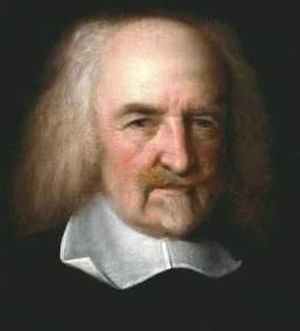
Thomas Hobbes 1588-1679.
Thomas Hobbes was born in the year 1588 in Malmesbury near Bristol in England, re-portedly prematurely, as his mother was frightened by the rumors of the Spanish ar-mada, which this year threatened England.
In his long life - he turned 91 years old - he experienced the English Civil War between the King and Parliament, the execution of King Charles and Cromwell's dictatorship. Several times he had to flee England for fear of his life. He stayed for long periods in France.
His father was a priest in London, but due to a brawl with some other local clergy, he was banished from the city. The father's older brother, who was an unmarried wealthy glove maker, then took care of the family.
The young Thomas Hobbes came to school when he was four years old. He was a diligent and skilful student. When he was between 13 and 15 years old, he learned logic and physics and translated Euripides' Medea from Greek into Latin verses. After four years at the University of Cambridge, he became the tutor of the powerful Cavendish noble family, perhaps around 1608 when he was about 20 years old. Most of the rest of his life he was associated with the Cavendish family, who supported King Charles I during the English Civil War between Parliament and the King.
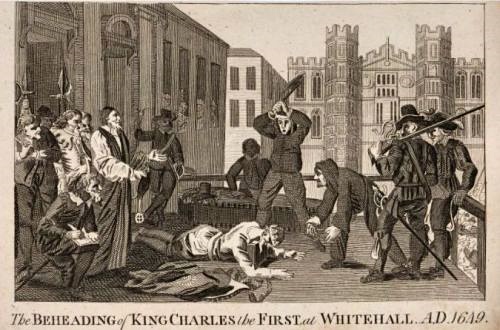
The beheading of Charles 1. in 1649.
He accompanied the young nobles on their educational journeys in Europe and thereby made many contacts. He met Galilei in Flo-rence and correspon-ded with Descartes. For a time he worked for Francis Bacon.
To warn his country-men of the dangers of democracy - it is believed - in 1629 he translated Thucydides' classic work on the Peloponnesian War from Greek to English.
He was known at the time as a scientist in optics, as a mathematician espe-cially in geometry, as a translator of the classics, as an expert in law and as a debater in metaphysics and epistemology. But he is rightly remembered by posterity for his work on morality and politics, which is especially expres-sed in his work "Leviathan".
2. Hobbes' State of Nature
For Hobbes, political leadership is unnatural and artificial - deliberately cre-ated by humans.
The state of nature is for him a state without leadership, without any autho-rity, a kind of anarchy. He argues that the only authority that naturally exists among humans is the one a mother has over her child because the child is so much weaker than the mother and dependent on her for her survival.
Hobbes wrote about human nature that it is dominated by: "desire for po-wer, riches, knowledge and for honor. All this can be reduced to the first, that is, desire for power. For riches, knowledge and honor are just different forms of power."
The individual is only interested in increasing his personal power, Hobbes said. "All of humanity are in a state of endless and restless desire for power - which stops only by death".
He wrote that every human being is capable of killing any other human be-ing. "Even the strongest must sleep; even the weakest can persuade others to help him kill another". He argues that because all adults are equal in this ability to threaten each other's lives, there is no natural source of authority that can regulate human life together.

Scene from the dys-tropic science fic-tion film Dancing to Death. Photo Media-KG-Portal.
As long as humans ha-ve not arranged an ef-fective government, they live in the "state of nature", according to Hobbes. It can occur in "the beginning of time" or in "primitive socie-ties". But his real point is that a state of nature could just as well occur in England of his time if re-bels were to succeed in overthrowing the king.
In fact, Hobbes' state of nature may emerge in the near future in any mo-dern society if the power structure collapses.
His description of life in the state of nature is one of the best known passa-ges in Western philosophy: "In such condition there is no place for industry, because the fruit thereof is uncertain: and consequently no culture of the earth; no navigation, nor use of the commodities that may be imported by sea; no commodious building; no instruments of moving and removing such things as require much force; no knowledge of the face of the earth; no ac-count of time; no arts; no letters; no society; and which is worst of all, conti-nual fear, and danger of violent death; and the life of man, solitary, poor, na-sty, brutish, and short."
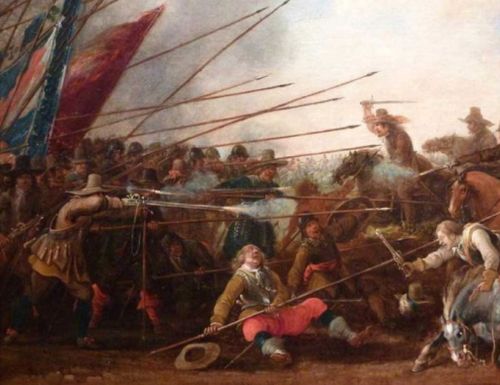
Second Battle of New-bury during the Eng-lish Civil War be-tween the king and parliament. Painting by Pieter Meulener. Photo Newbury History.
An agreement between people rarely includes exchanging services at the same time - as in a marketplace. It is most often the case that one party receives a ser-vice first, and the other party promises to provide its service later. Human cooperation is thus to a huge extent dependent on confidence that men will keep their promises and fulfill their part of an agreement - also at a later da-te. Likewise, ownership depends on others will respect this right for exten-ded periods of time, as it is not practical to guard one's property and pos-sessions by having them with you at all times.
But in a state of nature, agreements will rarely be possible because - in Hobbes' words - it will be regulated by the virtues of war, which are violence and fraud. Goods that are the fruit of hard and long-term work, such as agri-cultural products, buildings, handicrafts or modern industrial products, will be almost impossible to produce.
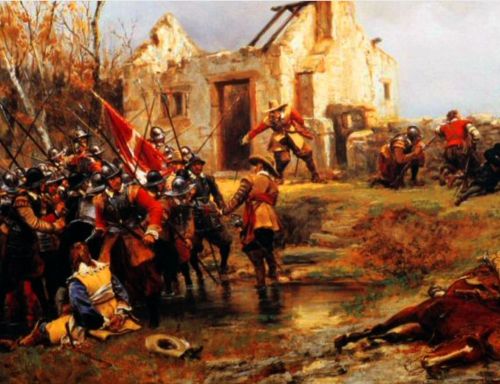
Scene from the Eng-lish Civil War. Painting by Ernest Crofts. Photo Pinte-rest.
Hobbes' state of nature is very different from Locke and Rousseau's descriptions of original states prior to the formation of society.
John Locke believed that life in the state of nature prior to the for-mation of society is not that bad. Men are free "to perform their actions and dispose of their posses-sions and persons as they deem appropriate, within the framework of the natural law." And "natural law" is reason which is given by God. Locke even lets men set preconditions for entering an organized society, namely human rights.
According to Rousseau, the state of nature was a kind of original paradise, and civilization and organized society have destroyed it.
Many have gotten the impression from Hobbes that he thinks we are all fun-damentally selfish and calculating. One might think that Locke and Rous-seau have a much more beautiful view of human nature. But Hobbes dug deeper.
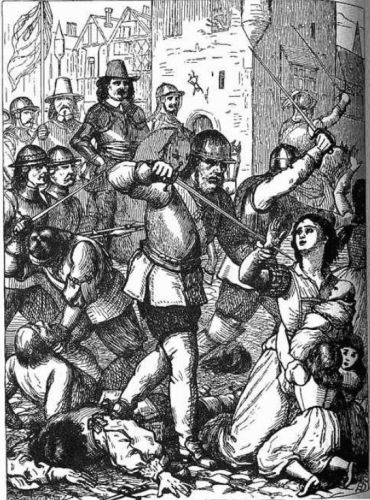
The massacre at Drogheda in 1649 in Ireland i 1649 in the English Civil War drawn by Mary Frances Cusack. Photo Henry Edward Doyle Wikipedia.
The thing is, Hobbes does not belie-ve that we are fundamentally and ut-terly selfish; nor does he believe that we are always rational in our ideas of what is in our interest.
We will challenge the death of love for the fatherland, we will torture ot-hers for their eternal salvation, he writes. Some go to extremes to get revenge, even if they thereby dama-ge their own position. Many are very concerned about what others think of them. When we act, we can do it cal-culating or impulsive or in ignorance obsessed with a religious doctrine or inflamed by the words of others.
In some situations, it makes good sense - at least in the short term - to put one's own interests first or use violence. If our lives seem to be at stake, we are unlikely to have many scruples about stealing a loaf of bread; if we per-ceive someone as a deadly threat, we may prefer to attack first while he is unprepared; if we think there are many potential enemies out there, it ma-kes good sense to create a reputation as a tough guy that is not easy to get along with.
If man has any "natural rights" at all, then the first one is certainly the right to prevent ourself suffering from a violent death, which is the right to self-defense that Hobbes argues many times. It must be the origin of the "right to life", which appears in modern human rights without ever being linked to anything concrete.
In Hobbes' words, malicious men will force good men to use the virtues of war, which are violence and fraud, for their own protection. Which to some extent makes Locke's and Rousseau's natural states into unrealistic paint-ings of beauty.
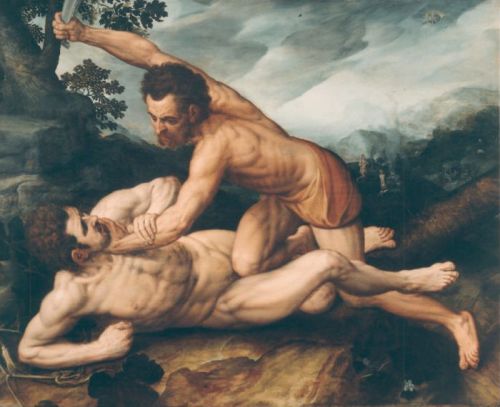
Cain kills Abel. Hob-bes used Cain's mur-der of his brother Abel to illustrate the meaningless vio-lence and murder of the state of nature. Painting by Frans Floris around 1556. Photo ResearchGate.
But Hobbes goes even further in his argument that a state of nature without a sovereign ru-ler is unbearable, even when populated by good men.
In the state of nature, we not only have the right to ensure our self-preser-vation - in the event that we are assaulted or the like - but we also each ha-ve the right to judge what will ensure our self-preservation.
He gives us good reason to believe that people rarely judge wisely. And in the state of nature, no one is able to define with certainty what is good jud-gement.
An example: If I consider that killing you is a sensible or even necessary step to protect my life, then I - in Hobbes' state of nature - have the right to kill you. Others may, of course, judge the case differently. But since every-one is insecure because mutual trust is more or less absent, there is little chance that we can peacefully resolve misunderstandings. Everyone wants to be a judge in their own case, and since the stakes are very high - life or death - it is best to be on the safe side.
3. Hobbes' Social Contract
Hobbes does not have much confidence in the vast majority of the people: "Most are too busy to find food, and the rest are too ignorant to understand."
A strong monarchy is needed to keep the lust for power and selfishness of men in check. "It is better to entrust the government to one than to many", he wrote in "Rudiments".
Hobbes argues that the only way to ensure peace within a nation is by for-cing the people to obey the laws of the land and punish those who do not.
To achieve this, the citizens must enter into a social pact with each other and jointly install a legitimate ruler, who must have a power so great that everyone must fear it and thereby force the people to keep peace among themselves.
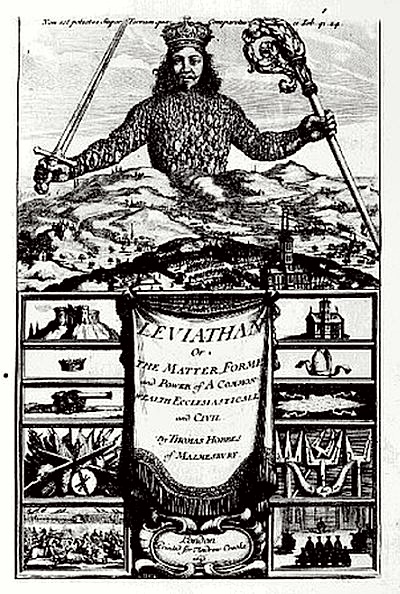
Leviathan is the name of a great ocean monster mentioned in the Bib-le. Hobbes' main work of this name was published in 1651. At closer in-spection we see that the king, who is depicted on the front page, con-sists of a number of small human fi-gures. It must undoubtedly symbolize the social contract that he believed citizens should enter into with each other in order to live in peace.
His social contract is not about demo-cracy, on the contrary. Nor it is a con-tract between the king and the people. The king must be strong and authorita-rian and not dependent on special per-sons or assemblies, for only an unlimi-ted and independent power will be able to settle disputes between the citizens, judge fairly, keep the people's selfish-ness and greed in ave and thus secure law and order.
Such an independent and autocratic power would involve the risk of abuse of power, but he believes that possible abuses by the ruler would be prefer-able to living in chaos. The king will be held accountable by God, he writes.
Hobbes energetically opposes the idea that a king has the right to rule be-cause he is descended from former kings or because he is king by the gra-ce of God, anointed and crowned by His representatives on Earth. How-ever, we must believe that the Danish autocracy, which was established in his lifetime, namely in 1660, was strongly inspired by the message of his "Leviathan".
Hobbes was the first to formulate the idea of a community contract. It was later taken up by Locke and Rousseau.
4. PRO Democracy
Hobbes can be understood as meaning that humans originally li-ved in loosely cohesive groups that were not governed by any ruler or regulated by laws and rules. When it was found that in this way life be-came a struggle of everybody a-gainst all, they created a mutual agreement that the individuals should give up their selfish impul-ses so that they could all live in peace. But there is no historical or anthoprological evidence that this was the case.
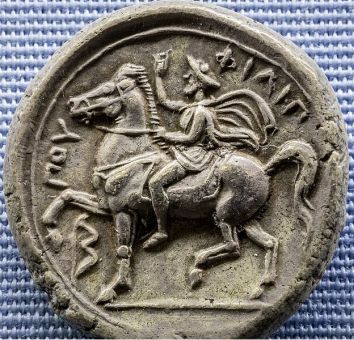
Coin showing King Philip of Macedonia from around 340 BC. Photo Wikipedia.
On the contrary, one can assume that the very early humans lived in manageable group led by a domi-nant male whose will was law. He-rodotus mentions at least fifty dif-ferent peoples in the transition be-tween the Bronze and Iron Ages, all of whom are referred to as king-doms.
Hobbes writes that people are mo-tivated by the desire to satisfy their lusts, he concludes from there that man is selfish.
But one cannot claim that all lusts are selfish. Men may want to pro-tect their family, fight for their ho-meland, or want to protect Christi-anity from heathen attacks.
Hobbes' autocratic ruler is an over-kill. His model of society is some-what reminiscent of what we would today call a permanent state of e-mergency.
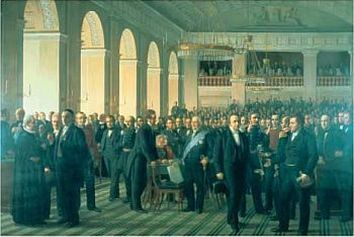
The Danish bsic law constituent sssembly in 1849.
In the clear light of hindsight, we can say today that it did not be-come necessary, less could do it. In fact, it was possible to maintain stable communities with less dra-matic means for a few hundred years. For almost two hundred years now, European democracies have created prosperity and order. Apart from a few periods of war, democracy has ensured uninter-rupted growth. Today, everyone can go anywhere without fear for their life and property.
Experience shows that it is com-pletely possible for a democratic system to create the basis for a happy life for the individual. Until now, a permanent state of emer-gency, as recommended by Hob-bes, has not been necessary.

State of emergency in Mysore, India. Photo Filmyloop.
Thomas Hobbes was completely wrong. Anyone can convince them-selves of this, by looking at their everyday lives and reading the re-cent history.
We prefer a democracy to a dicta-torship because we know that no human being is infallible, not even a king. It is better that the people hold on to the long end and are able to say stop if it goes too far.
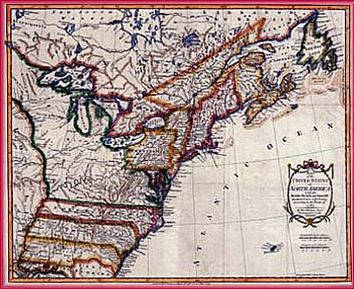
The 13 rebellious English colonies in America.
"No taxation without representation " was the language of choice of the American revolutionaries in 1765. It must be said that it is a fairly rea-sonable demand that the taxpay-ers who have to pay have a say in the decisions.
The Danes are a free people. We are not slaves or serfs. It seems fair and reasonable to us that or-dinary taxpayers also have some formal political power. It will also help ensure that the country's ru-lers will treat citizens with respect at all times.
CONTRA Demokrati
Understanding Hobbes' state of nature as a history of evolution is superficial and does not capture his important point, which is to pro-vide a philosophical rationale for a particular type of government. His description of the state of nature and the contract of society is an analogy which should show us why we should obey the law. What is important is his analysis of hu-man nature and the need to have a ruler with absolute power who can control human excesses.
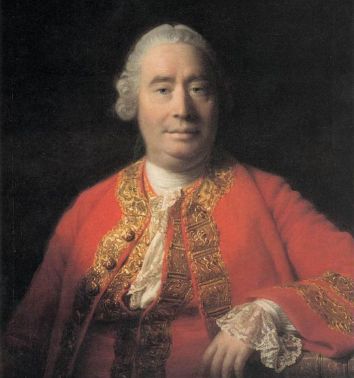
The Scottish philosopher David Hume 1711-1776.
Humans are at all times driven by their emotions, as Hobbes writes. One hundred years later he was confirmed by Hume, who wrote: "Reason is, and should be, only a slave to passions, and it can never pretend to have any purpose other than to serve and obey them".
Thus, he believed that emotions are the first cause of the logical conclusions of reason and thus our actions. For example, we have a feeling of hunger, and therefore we start our reason to find out how we can get some food. Or a feeling tells us that we want some sex, and therefore our reason begins to make a logical and realistic plan to achieve this.
Furthermore, Hobbes describes in more detail how the passionate desire to stay alive and protect property and the family which they love can motivate even good men to evil deeds.
Modern democracies can only exist because they are favored by historically exceptional conditions.
The American and European de-mocracies were born at the same time as the Industrial Revolution. For the last two hundred years, they have experienced almost uninterrupted technological and economic progress. Apart from the wars, they have, so to speak, de-veloped in tailwinds. American de-mocracy has further benefited from exploiting a large and virgin land filled with all kinds of resources.
In the early history of civilization, democracy has not been very common or long-lasting. Only a few, small and manageable coun-tries and cities had this form of government.
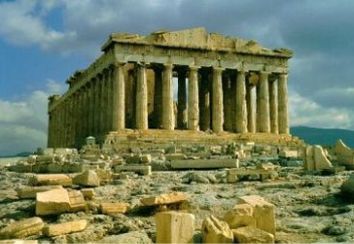
Athens' Akropolis.
Most famous is the democracy of Athens, a small city-state in an-cient Greece. Athens was a mana-geable state the size of Funen or Zealand islands. Athenian demo-cracy lasted only about 200 years.
The small Swiss cantons have had democracy for a some hundred years. Wilhelm Tell led the Swiss in their freedom struggle against the Habsburgs around 1300.
Some of the Italian city-states e-lected their own leaders, as the Venetians did in 726, when they seceded from the Eastern Roman Empire.
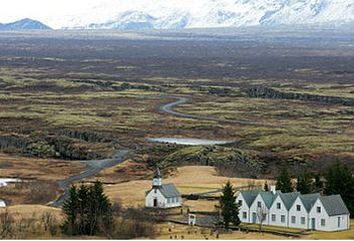
The Tingvellir plain in Ice-land, where the landnam men met.
In Iceland, the landnam men and their descendants met every year in Alting and solved common pro-blems by negotation.
In general, it seems that demo-cracy can only exist for a long time in small manageable communities that are ethnically and culturally homogeneous.
In a possible future where the eco-nomy is not in continuous growth, and where the rich get richer, and the poor get poorer and the na-tions will be populated by a diver-sity of ethnic and religious groups, Hobbes' prediction may still come true.
5. John Locke
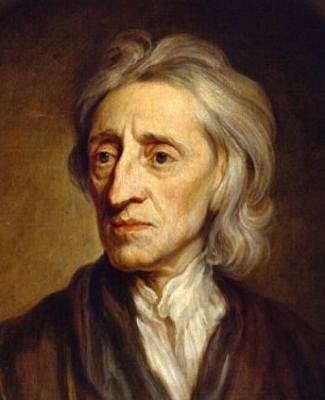
John Locke 1632-1704. Painted by Godfrey Kneller in 1697 - Godfrey Kneller Wikipedia.
The English philosopher John Locke was Thomas Hobbes' contemporary, but so-mewhat younger. He created the philo-sophical direction, empiricism.
There is nothing in a human conscious-ness that has not first been in the sen-ses, he wrote. Consciousness is at birth an empty tablet, "Tabula Rasa".
Man can thus not be born with any ten-dency to form societies, but neither with any other tendency such as strong ego-ism. Human nature is therefore complete-ly open. They can love their fellow human, but they can also be aggressive and selfish.
John Lockes is the architect behind the Western democracies as they exist today. He presented his ideas in his political masterpiece "Two Treatises of Government" in 1690. It was formulated as arguments against a Robert Filmer who had written that society was a large family with the king as the father.
Many passages in the American Declaration of Independence and Constitu-tion such as "All men are created equal", "life, liberty and the pursuit of hap-piness" and "we hold these truths to be self-evident" is copied more or less directly from "Two Treatises".
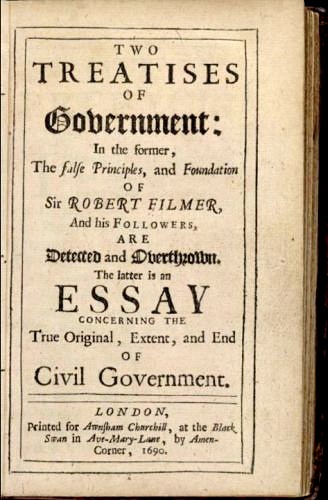
Two Treatises of Government from 1689. John Locke's name does not appear on the front page, because it was published anonymously - just in case. Foto WriteWork.
Like Hobbes, he believes that prior to the formation of society, humans lived in a state of nature, which he described quite briefly: "To understand political power right, and derive it from its original, we must consider, what state all men are na-turally in, and that is, a state of perfect freedom to order their actions, and dis-pose of their possessions and persons, as they think fit, within the bounds of the law of nature, without asking leave, or depending upon the will of any other man. A state also of equality, wherein all the power and jurisdiction is reciprocal, no one having more than another. There being nothing more evident, than that creatures of the same species and rank, promiscuously born to all the same advantages of nature, and the use of the same faculties, should also be e-qual one amongst another without subordination or subjection, unless the lord and master of them all should, by any manifest declaration of his will, set one above another, and confer on him, by an evident and clear appoint-ment, an undoubted right to dominion and sovereignty."
"The Law of Nature" is given by God. Man comes to the realization of the natural laws with their reason, which is also given by God.
Elsewhere he writes about the state of nature: "want (lack) of a common judge, with authority, puts all men in a state of nature" and "Men living togeth-er according to reason, without a common superior on earth, with authority to judge between them, is properly the state of nature."
The state of nature is thus a state characterized by freedom: "a state of per-fect freedom to order their actions".
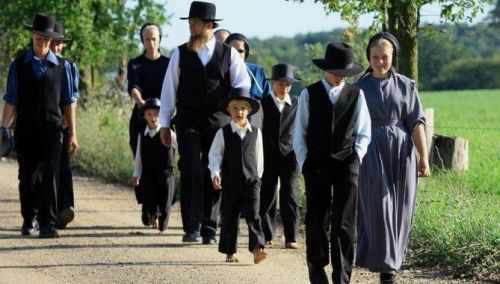
An Amish Family from Lancaster County, Pennsylvania. John Locke lived before the Amish came to A-merica, perhaps even before they origina-ted in Europe. But apart from that, they are a good illustra-tion of his stubborn claim that the state of nature existed in the real world. Amish communities seem to live peacefully with each other and be able to solve their problems through reason and conversation. Photo Kodoom.
We also note that Locke emphasizes that in the state of nature, all human beings are born equal: They are "promiscuously born to all the same advan-tages of nature, and the use of the same faculties", which, however, we must regard as a dubious assertion, since many human characteristics - or lack thereof - are genetically determined. Here we must consider who the author is, namely the empiricist John Locke, who believed that there is nothing in a human consciousness that has not first been in the senses and that consciousness at birth is like a blank slate.
But he also writes that no one is subordinate to another at birth, and no one is born with authority over others, which sounds more reasonable.
A special feature of Locke's state of nature is that men can own land, cattle and other property. Property rights are therefore a right that men have prior to the formation of society, he writes, and therefore a government cannot take a man's property away from him.
At Locke, people are thus not desperate to form societies. His state of na-ture sounds a lot like the lost paradise. Therefore, they allow themselves to set preconditions for entering into the social contract. Locke calls these con-ditions rights. It is about the rights that human beings had in the state of na-ture, which they also want to apply under the social contract, namely the right to "life, liberty and property." These are the origins of modern human rights.
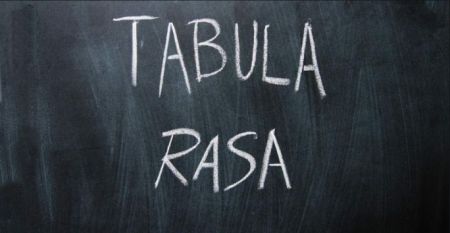
Tabula rasa is a Latin term meaning a "cleansed tablet". In Locke's empi-rical epistemological philosophy, the tabula rasa thesis is very im-portant. At birth, the human consciousness is an "undescribed tablet", which means that all knowledge enters later through the senses. The individual shapes his own soul and personality. Foto RRR.
If the rulers in the social contract violate the "rights", the citizens have the right to rebel, he believed.
Life: We all have the right to preserve our lives and the right to defend our-selves against others who will take our lives. Murderers , however, lose their right to life as they act outside the law of reason.
Freedom: Locke further argued that individuals should be free to make choices about how they want to live their own lives, as long as they do not restrict the freedom of others.
Property: Individuals have the right to own property that a government can-not deprive him of.
Equality: He wrote that all individuals come into the World equal and alike. This must be seen in the light of his empirical theory, which states that the human consciousness at birth is an "undescribed tablet". They are "born without distinction with all the same natural benefits and abilities", which means that all knowledge comes in later through the senses. The individual shapes his own soul and personality. It was in opposition to Plato, who said that the individual already knows the truth and will recognize the truth when it is shown to him by logical arguments - as he let Socrates do with his cun-ning questions.
But here he must be on the wrong track. It is quite obviously not true that all children are born equally athletic, equally intelligent, equally beautiful, e-qually strong and and with same complexion, and we can assume that the equality consists in the fact that they are all born with the same "inalienable" natural rights which are given by God and can never be taken from them or given away, as he also wrote.
Many have understood that Locke believed that the state of nature exists at all times and in all places, where there is no legitimate political authority that has the power to judge in disagreements between citizens, and where people live in accordance with "the law of reason" - which must mean that they themselves negotiate with each other. His state of nature thus differs from the political society, where there is a legitimate government, and from a state of war, where men do not abide by the law of reason.
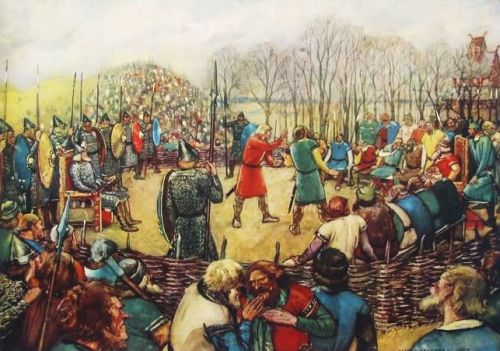
Scandinavian ting in the Viking Age. Un-known artist Foto Blogspot.com.
Locke's state of nature brings us to think of the original small Germanic kingdoms that existed before they were united in modern states such as Denmark, Norway, Sweden, Germany, etc. and which we can re-cognize in the Land-nam era in Iceland. Every year, tings were held where people negotiated and judged in accor-dance with old laws. A "law-saying man" was tasked with remembering the laws and presenting them to the assembly. The king judged in difficult ca-ses.
Perhaps we can also recognize Locke's state of nature in the Western Ame-rican settler communities, far from the big cities, where the inhabitants themselves organized with sheriff, church, and so on.
Like Thomas Hobbes, he advocated the idea of a community contract. He believed that individuals with their reason can be made to realize that they will have better opportunities if they enter into a community contract. In par-ticular, there were three problems in the state of nature that could be reme-died by a social contract and the resulting joint authority:
1. Each man is his own judge, which can lead to subjectivity and disagree-ment.
2. Even where it is obvious that a man has violated the law, he can be so powerful that ordinary men do not have the power to punish him.
3. Punishments can be subjective. A man who steals a loaf of bread can be hanged somewhere while the same crime is punished with a fine else-where.
Locke did not demand a republic. He uses the term Common-wealth in the sense "an independent society" but "whatever form Common-wealth is un-der, the ruling power should govern by declared and adopted laws and not by temporary dictations and arbitrary decisions."
"Law and not force, must be the basis of government. A government, which is not based on law, is oppressive."
"Democracy is government based on law, that is created after long conside-ration by appropriate elected representatives of the people and proclaimed in a way, that all men can become acquainted with them." And elsewhere: "In addition, governments are required to have the consent of the individual, which is the consent of the majority, which it gives either directly or through their representatives elected by them."
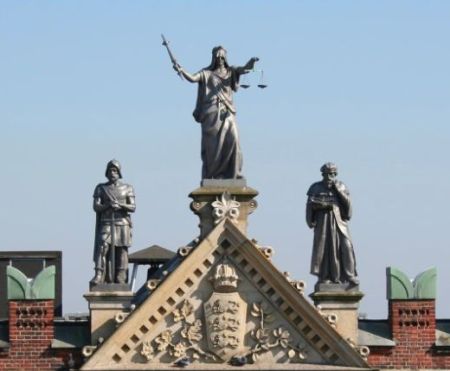
The three figures at the top of Odense City Hall symbolize the division of power. At the top in the middle is the judiciary power in the form of the goddess of justice, Ju-stia, blindfolded. To the left, the executive power is represented by a medi-eval town official wear-ing an iron hat and armed with a sword. To the right is a learned man with a law book repre-senting the legislature power. The three figures were made by the sculptor Aksel Hansen in 1882. Photo Claus Thøgersen Stadsarkivet.
To protect the people from a concentration of power, Locke envisioned a government divided into three branches, with each branch acting as a control of the other two. Locke called these branches the executive, legi-slative, and federal powers. The executive and the legislative would have much the same function as they have today, but the duty of the federal po-wer consisted in conducting negotiations with foreign powers.
However, in 1748, the Frenchman Montesquieu proposed to divide power into an executive, a legislative and a judiciary, that is, government, parlia-ment and courts, which division is used in Denmark today.
But the most important democratic element of Locke's theory is his attitude towards government. Society is created to eliminate the shortcomings of the state of nature. When people leave the state of nature and join the covenant of society, they surrender the right to punish to a leader they appoint. But the crucial factor that Locke highlights here is that the leader - the govern-ment - is appointed by the people and therefore accountable to them. As he says: "The whole purpose of government is to make laws for the regulation and preservation of property and for the defense of society against external aggression, all this only for the common good."
Locke's theory is, so to speak, that the government is merely a trusted se-cretary. We have entrusted him with the means of power to do the things that we find difficult or impossible to do ourselves, just as we can authorize a secretary to take care of our business when we are busy with other things. But if the secretary abuses our trust - perhaps commits embezle-ment - we can fire him. And if the government abuses our trust by usurping our legitimate authority, we can dismiss it.
The principle of a true democracy is thus that it is the people who sit at the end of the table. And when the boss has spoken, the government just has to clap its heels together and say "yes boss".
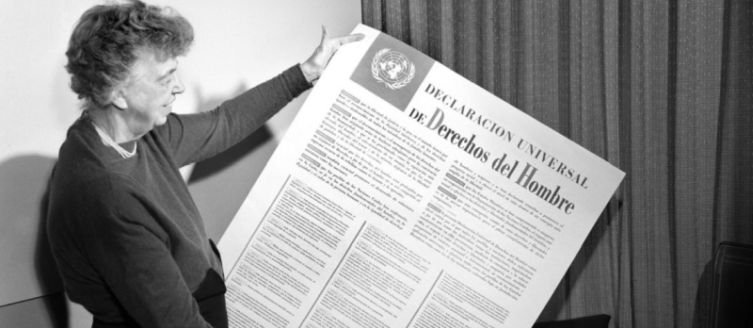
The feminist icon, First Lady Eleanor Roosevelt, shows a poster with the Universal Declaration of Human Rights. Mrs Roosevelt chaired the committee that drafted the declaration in 1948. Photo FN Photo archieve.
Lock's "rights" can be found in the American "Declaration of Independence" from 1776 and the "Bill of Rights" from 1789. They can also be found in the "Declaration on Humans' and Citizens' Rights" of the French National Assembly from 1793.
Motivated by the Holocaust of the Second World War, the United Nations in 1948 passed a Declaration of Human Rights. The UN Declaration revived the idea of such rights, and forms the basis of their current elevated status. EU has also issued a Declaration of Human Rights.
6. PRO Democracy
It was Locke's great merit to show that Hobbes' idea - that individuals should give up their rights and seek protection from themselves and the chaos of the state of na-ture by concluding a social con-tract and submitting to an absolute ruler - would be a great mistake.
By giving up their rights and sub-mitting to an absolute ruler, hu-mans would not become more se-cure than they were in the state of nature, for now they would be ex-posed to the whims and caprices of the ruler, and their lives would again become insecure, they would simply have swapped one kind of chaos out with another.

Tolerant and kind person. Photo Skillup.
We do not have to have all these theoretical philosophical discus-sions at all, we can just take a look at reality!
For almost two hundred years now, European democracies have crea-ted prosperity and orderly condi-tions. Apart from a few periods of war, democracy has ensured un-interrupted growth. Today, every-one can go nearly anywhere with-out fear for their life and property.
In the 70 years that have passed since the end of World War II, we-stern democracies have experien-ced uninterrupted technical, eco-nomic, and cultural progress that has not been disrupted by revo-lutions, civil wars, or other major crises. Today we drive around in advanced cars, which always start, very different from the rust piles one drove in 60-70 years ago. We have holidays in exotic countries instead of camping at the western coast, and we use computers for everything, and tolerance, equality and freedom have reached unpre-cedented levels.
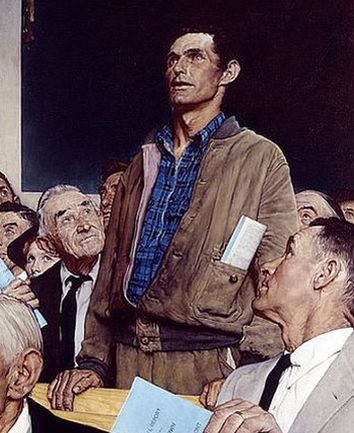
Our traditional view of freedom of speech.
John Locke created the principles of modern Western democracies. For two hundred years now, they have created the framework for the citizens' lives in growth and pros-perity.
"All human beings are born equal".
This is interpreted today as mean-ing that everyone is equal before the law and that everyone has an equal vote in the election of go-vernment officials. For the same crime, rich as well as poor will be sentenced to the same punish-ment. Both rich and poor people each have only one vote in the election of society's government officials.
The universal aspect of human rights is fundamentally important. The starting point of the UN Uni-versal Declaration of Human Rights is that they apply to the whole World: "All human beings are born free and equal in dignity and rights".
Precisely the fact that human rights apply to everyone must ser-ve as a bulwark against a repeti-tion of atrocities, such as those committed during World War II.
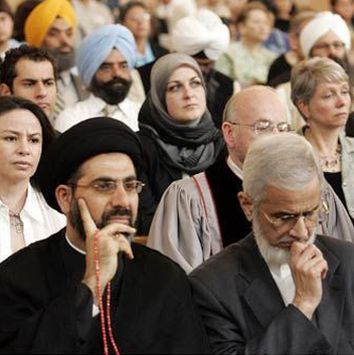
Human rights are also about protecting minority religions.
In addition, human rights are about the recognition of ethnic minorities, minority religions and the protec-tion of cultural diversity, as well as the protection of women and the poor.
Democracy is the best system be-cause it guarantees the right of all people to self-determination. In ge-neral, democratic governments are more peaceful, more prosperous and less in conflict with other de-mocracies.
The Austrian philosopher Karl Pop-per has pointed out that democra-tic elections are a legitimate and non-violent way of resolving politi-cal disagreements that prevent civil wars and other internal unrest.

Democratic elections in Russia. Photo Infourok.ru
When you look around the world, it is obvious that in democracies there is far greater respect for mi-nority religions and property rights. Governments in democracies, as a general rule, place no restrictions on where citizens travel in their ho-me country or abroad. As a gene-ral rule, the police treat citizens correctly and respectfully, which is very often not the case in dictato-rial countries.
Citizens in democracies are gene-rally satisfied with the freedoms they enjoy, and this has a demoti-vating effect on the desire for re-bellion and civil war.
In democratic countries, the people has the power and who ultimately decides. That is precisely why it has never been seen in modern ti-mes that a democratic government more or less directly kills and ex-terminates millions of their own people, such as Stalin. did in the Soviet Union, Mao in China and Pol Pot in Cambodia.
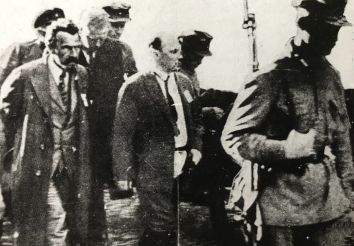
Nikolaj Bukharin and Alexei Ry-kov are arrested in 1938 Photo TASS - Picture from "The Rus-sian Century" Wikipedia.
The democratic nations of the West are far from flawless, but they still have a long way to go be-fore they reach the level of Stalin's and the Soviet Union in terror a-gainst their own people. In 1937, Stalin's former comrade-in-arms from 1917, Bukharin, sent him a letter from his death cell, which ve-ry well describes the extent and nature of the Communists' absurd terror against their own people: "From the brink of the abyss from which no roads leading back" - "This purging includes:
a) the guilty.
b) the suspects and
c) the potentially suspects.
It therefore had to include me as well" - "One can be sure that peop-le will inform against each other and thus forever cease to trust each other" - "In this way, the leadership's position will be per-fectly guaranteed."
His letter to Stalin did not benefit him, he was executed shortly after.

The Chinese Cultural Revolu-tion, a teacher or another high-ranking person is condem-ned as a counter-revolutiona-ry. Photo Head of Ravenclare House - Twitter.
The Chinese Cultural Revolution was characterized by powerful or-ganizations - including Mao himself - allowing teenagers attack their teachers, many times resulting in their death, destroying irreplace-able cultural values and, in gene-ral, terrorizing everyone and any-one who aroused their displeasure. The Cultural Revolution damaged China's economy and traditional culture and the estimated death toll ranges from hundreds of thou-sands to several millions. It is ne-ver formally finished. The build-ings and churches that the Red Guards seized "in the name of the people" are still in their posses-sion, no one has been held ac-countable and no one has been re-habilitated.
The modern autonomous, BZs and BLM terrorists in the West function much like the Red Guards in Chi-na, behind the scenes backed by powerful politicians and organiza-tions. However, the democratic nations of the West have not yet reached as far into self-destruction as Communist China during the Cultural Revolution that began in the 1960's.
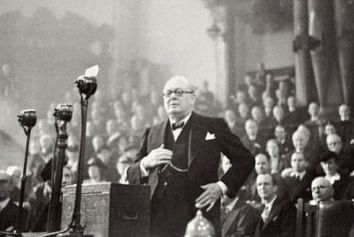
Churchill's "blood, wear, tears and sweat" speech in Parliament May 13, 1940. Foto BBC archieve.
As Winston Churchill said in a speech in 1947: "Many forms of government have been tried and will be tried in this world of sin and woe. No one pretends that demo-cracy is perfect or perfectly wise. In fact, it has been said that demo-cracy is the worst form of govern-ment except for all the other forms that have been tried from time to time."
CONTRA Democracy.
Locke's arguments against Hob-bes' idea of a people in a social pact under an absolute ruler de-pend in part on his theory of hu-man nature - or more correctly, lack of nature.
Hobbes seems - in some sections of his works - to think that human nature is aggressive and selfish, while Locke thinks that a person's consciousness at birth is a blank slate and everything depends on the individual's subsequent expe-riences, so that some will develop to become tolerant and friendly ot-hers will become selfish and ag-gressive.

Selfish and aggressive men. Photo med-mash.ru
But here one must object, as Hob-bes also says, that it will be the selfish and aggressive who set the agenda. The tolerant and kind can not in the long run just offer the ot-her cheek - it would be their down-fall.
They will have to defend themsel-ves against the selfish and aggres-sives' attacks and provocations by equivalent or even more gruesome means. So that the state of nature which Locke portrays as idyllic - and which he with his rights will preserve parts of under the Cove-nant of Society - will in the long run be as chaotic and unbearable as Hobbes' state of nature.
Locke's theory is completely de-pendent on concepts that he him-self has created, including in par-ticular his "rights", whether they correspond to something that exists or happens in the real world.
The utility philosopher Jeremy Bentham (1748-1832) thus thought that the idea of human rights was nonsense. "Right is a child of law: from real laws come real rights, but from imaginary laws, from "natural laws", come imaginary rights - natural rights is simply nonsense"
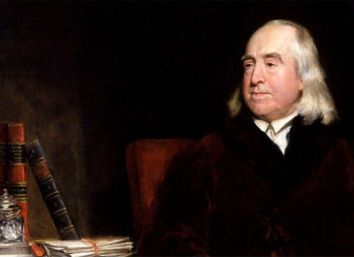
Jeremy Bentham 1748-1832.
Without laws and authorities with the means to enforce the laws, any man can possess only the goods and riches which he is able to de-fend by force. Without laws, there-fore, one can not speak of anyone having a "right" to something, nei-ther property, life, health or free-dom of speech or anything else.
Basically, the word human rights does not describe a right under ordinary laws that exist. They are more a moral imperative, saying that it should be so. Other moral imperatives, such as the Ten Com-mandments, are demands of the individual on how he should per-sonally treat others, while human rights are more the individual's de-mands on how he wants to be treated by others - including most of governments and other powerful organizations.
In the really long historical per-spective, the biggest concern with a democratic system must be whether it is really possible.
Is it at all possible in the really long run to maintain a stable society on the basis of the voters' changing moods and sympathies?
After all, Locke did indeed place many restrictions on the power of a government. Power must be di-vided into three branches. The government must be completely subordinated to a constantly de-bating and intriguing parliament. Inviolable human rights give citi-zens the right to rebel if they are not respected. Regular elections create new governments every few years possibly with completely dif-ferent ideas and plans.
In modern democracies, there is a clear trend that a parliament forms two rival groups, each with about 50 % of the seats. It is a kind of game theory law of nature. In the United States it is the Republicans versus the Democrats, and in Den-mark it is the "right wings" versus the "left wings".
If one of the wings is gaining ground on the other's expense, the losing party will acquire some of the rivals popular positions, and thus restore equilibrium.
If the left is gaining ground on right's expense, the right wings can restore equilibrium by pro-moting some very politically cor-rect views upon foreign policy, which are popular among the left-wing voters.
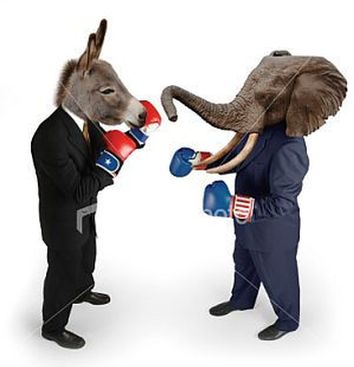
Republicans versus Democrats
If right wings win ground reducing the influence of the left wing, then the left wing can show increased understanding towards tax cuts and savings in government spen-ding or the like, and thereby regain terrain.
It is a kind of stable game theory equilibrium.
For this reason democratic govern-ments are allways based on very slim majorities among the voters.
No governments, right or left wings, can pursue plans, which do not give result before the time of the next election. Democratic countries are deemed to work with very short horizons.
This makes it extremely difficult for a government to pursue a long-term policy. At the first sign of even slight discomfort, some marginal voters immediately want to shift side. And then there is something called premature elections.
A long-term strategy or policy will of-ten be characterized by that you give up some benefits here and now in order to achieve some ma-jor benefits in the future.
China is not a democracy. Their system is democratic centralism. That is precisely why, they are able to pursue a long-term strategy. Their plan is develop themselves as a high-tech industrial nation, while keeping the cost of man-power low. When they are ready, they will enter the markets of all business areas. They will offer the same as the West, just cheaper.
In fact, the democratic system is not the cause of our wealth. It is reversed. We can allow ourselves to have a democratic system with all its drawbacks, because we can afford it.
In reality, the danish democracy has already been compromised.
The legislative and the executive powers have in collaboration al-lowed hundreds of thousands of foreign immigrants to settle in the country and share its assets and resources - without asking the people.
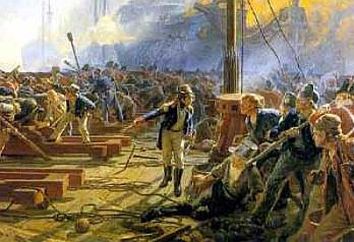
The battle of Copenhagen 2. april 1801 against the Eng-lishmen.
All John Locke's cunning ideas with dividing the power in three branches, periodic elections and inviolable human rights have all been in vain. The bureaucrats from the executive power have already displaced the people from the dri-ver's seat of the nation.
The immigration has a size, which is comparable to the entire popu-lation of a Danish province, let's say that of the islands Lolland-Falster. The country is changed for hundreds of years into the future. It can be compared to the situation, as if the executive power had sub-mitted equivalent Danish territory to a foreign power - without asking the Danish people!
Yes, some politicians have even arrogantly stated, that such issue is not suitable for a referendum.
For centuries, the Danes have de-fended themselves with weapons in hand in order to prevent foreig-ners to take our land. Danes have defended themselves against Swedes, Prussians and English-men.
Now, the politicians simply have slammed the door open. Not a single shot has been fired not a single stone has been placed in the the foreigner's way. The new conquerors do not need soldiers, they only need to bring some cry-ing children in the frontline. Many say, they were invited to come.
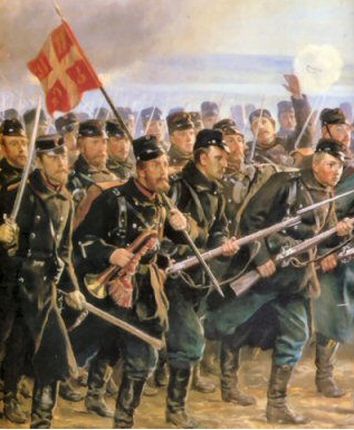
8. Brigade's counterattack a-gainst the Prussians 18. April 1864 at Dybbøl - Painting by Wilhelm Rosenstand.
Locke created human rights as a weapon for the people if the go-vernment crossed the line. Today it is just the opposite. The executive power uses the rights as a weapon against the people. When the po-pulation protests against the immi-gration, the politicians answer that "we really have to, international o-bligations, human rights, you must understand."
7. Litteratur
Leviathan by Thomas Hobbes Project Gutenberg"Was Democracy just a moment? af Robert D. Kaplan The Atlantic Online
Two Treatises of Government Lonang Institute
Social Contract Theory The Internet Encyclopedia of Philosophy